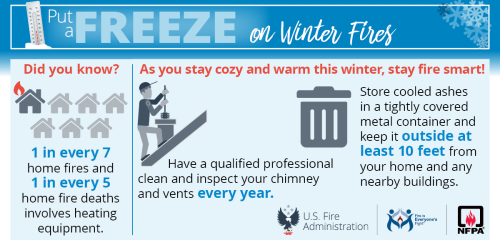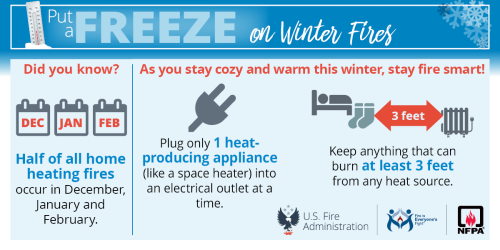Put a Freeze on Winter Fires By Taking Some Home Heating Safety Precautions
 The cold weather is here and with the possibility of another round of freezing temperatures this weekend people will be turning up the heat to keep warm, but the kind of heating system you use could turn deadly if not properly maintained.
The cold weather is here and with the possibility of another round of freezing temperatures this weekend people will be turning up the heat to keep warm, but the kind of heating system you use could turn deadly if not properly maintained.
The National Weather Service says to expect temperatures in Northeast Georgia to dip into the teens Friday and Saturday night and low 20s Sunday night, with highs Saturday only getting up to around 36 degrees.
According to the U.S. Fire Administration, heating fires were the second leading cause of home fires in 2021. An estimated 32,200 home heating fires were reported to fire departments within the United States. These fires caused an estimated 190 deaths, 625 injuries, and $442 million in property loss.
Terri Blackmer is the Director of the Fraud Division for the Georgia Insurance and Safety Fire Commission. Blackmer cites several types of heating systems that can be deadly if not used properly.
First, is the possibility of a gas leak if you use propane or natural gas to heat your home.
Blackmer says danger arises when there’s an undetected gas leak, which can cause a build-up of carbon monoxide.
“One of the biggest issues with carbon monoxide, which emits from any type of natural gas usage like propane, is that it’s odorless and colorless,” Blackmer said. “And so unfortunately, you’re not going to be able, without a carbon monoxide detector – and those have to be good and you have to maintain the upkeep of them – you’re not going to be able to detect it.”
Carbon monoxide is odorless and robs the room of air and as you breathe, instead of breathing air, you are taking in carbon monoxide, which can cause illness and death.
Symptoms of carbon monoxide poisoning include headaches, dizziness, fatigue, and flu-like symptoms, such as nausea and vomiting.
If you are experiencing those symptoms and you use propane or natural gas to heat your home, Blackmer advises you get checked out immediately by a doctor, and she says there’s a simple and free way to determine if your propane or gas heating system has a carbon monoxide leak.
“My first recommendation is to contact your local fire department and get them out there ASAP. They have what’s called a “multi-gas detector,” and they can detect gas leaks in much smaller amounts than your commercial carbon monoxide detector,” she explained.
And when the temperature drops those with fireplaces like to keep them going
Also, if you use a fireplace to keep warm, Blackmer says you need to stay on top of keeping it and the chimney flue clean.
“You need to make sure you’re getting the fireplace inspected on an annual basis. And before you go to bed make sure the fire is completely out – that there are no embers still burning. You should also have a fire screen in front of your fireplace in addition to the chainlink screen,” Blackmer said. “And even if the fire is out, you still need to make sure the damper remains open because even if the fire is out, you shut the damper and there’s still smoke, it can cause the room to fill with smoke and smoke is just as deadly as fire.”
Many people use kerosene heaters in their homes but Blackmer said kerosene heaters in the home are not a good idea because they can easily catch nearby furniture or clothing on fire.
“I never recommend kerosene heaters,” she said.
Additionally, Blackmer says the best space heaters, if you need to use one, are the new ones that will automatically shut off if tipped over and turn off if they get too hot.
And she said never ever plug an extension cord with a space heater. She said it’s best to plug them into a GFI outlet, which are designed to trip if a cord overheats and shut the heater off.
